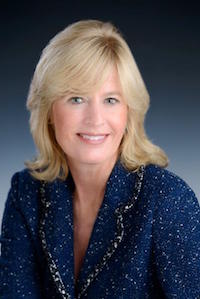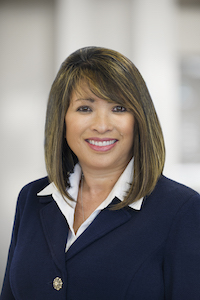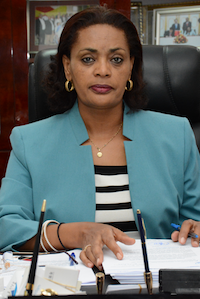In early 2013, a group of industry women, dubbed the Women in Power committee, assembled in Orlando, Fla., to figure out how to honor women who have dedicated their careers to the power industry. The industry is dominated with men making up more than 75 percent of the workforce, according to estimates.
The Women in Power committee believed that it was time to give recognition to the pioneering women who have worked to advance the power industry in the hope that the women selected as finalists will serve as inspiration to young women to embark on careers in energy. To do this, the committee decided to allow anyone in the industry to nominate a woman for a Woman of the Year Award, which would be given out during Power Generation Week. To judge the nominees, the committee came up with three focus areas.
The first and most important accomplishment that the committee believed a potential POWER-GEN International Woman of the Year should have made is advancing the power industry. In addition, the committee judged nominees by their leadership abilities, as well as the ability to collaborate with, influence, and mentor others. Finally, the committee believed that a potential Power-Gen Woman of the Year should affect her community through industry associations and other organizations. Past winners are Roxann Laird — Southern Company (2016), Kim Greene, Southern Company (2015); Mary Powell, Green Mountain Power (2014); and Ria Persad, StatWeather (2013).
After two months of collecting nominations, the 14-member committee voted on the nominees and decided upon three finalists, who are described below. One of these three finalists will be named the 2017 POWER-GEN Woman of the Year during the Power Generation Week keynote session, which takes place in Las Vegas on Dec. 5.
The 2017 POWER-GEN Woman of the Year will give a short keynote speech during the Women in Power Luncheon on Dec. 5 at the Las Vegas Convention Center. Following her speech, the finalists will participate in a panel discussion during which luncheon attendees will be able to ask them questions about their careers.
Azeb Asnake — Ethiopian Electric Power
As CEO of Ethiopian Electric Power, Azeb Asnake is responsible for construction and operation of generation plants, transmission lines and substations. Additionally, she oversees the sale of electricity to the neighboring countries and the export of power to Sudan, Djibouti and border towns of Kenya. When she first entered the industry, Ethiopia’s electric energy was mainly hydro based and the generation capacity was 2,430 MW. Since then, generation has grown to 4,500 MW. One goal of Ethiopian Electric Power under her guidance is to become a power hub of Africa and reach a generation capacity of 17,000 MW by 2020 to create a system which will carry and sustain the economy level of a middle-income country.
In Ethiopia, most economic sectors were led by men; women’s leadership in engineering fields was almost nonexistent. Now that one of the most important economic sectors, power generation and distribution, is led by a woman, it has created enthusiasm and motivated high school and university female students to go into engineering schools. Many of these women consider Asnake an inspiration and role model.
How has being a woman helped your engineering/professional career?
Starting from my university life, I have heard lots of discouraging and disappointing comments from my teachers and classmates that engineering is a difficult field for a woman. Even though such threats from a male-dominated society were very common, there were times when it became annoying, disappointing and disturbing. However, it helped me to provoke my determination and commitment to show that I am capable. It was a real challenge for a woman to overcome such untamed behavior in Africa except by showing that I can.
This struggle has created a deep sense of dynamism in me. Consequently, it made me strong towards achieving my goal. I was determined to show that I am as good as the male students. It was a blessing in disguise, as I was encouraged to strive for good results and pursue my engineering studies.
When I was assigned to lead the 1,870-MW Hydropower Project, while all other projects of lower capacity were led by men, I was expecting similar challenges such as “How can she lead such a big and complex project?” and prepared myself psychologically to take it positively and use it as a triggering effect to my strength.
On the other hand, as a mother of two kids, it was a real challenge to handle both family and career with all the above confrontations. However, I always strived to prove my capacity as an engineer and I am now accepted and assigned even for a more demanding position – leading more than 5,000 employees while overseeing construction of more than 11 generation and 15 transmission and substations projects.
Of course, I also give due recognition and appreciation to those few male friends, colleagues, subordinates and superiors who encouraged and supported me in the process. Attitudinal changes that came as a result of on-going societal, political and economic developments have also played important role in obtaining support.
What are you most looking forward to in the rest of your career?
As an engineer in the power sector and the CEO of a company solely responsible for my country’s power supply, I would like to see the realization of adequate electric power supply that fully satisfies the requirements of the rural areas of Ethiopia. Specially, as an Ethiopian woman and a mother, I recognize the hard life of the rural women, who travel very long distances to collect wood for their energy sources. During this process, women are confronted with abduction and other dangerous man-made and natural acts.
Access to electricity in Ethiopia is only 55 percent where connectivity is about 35 percent. This means that more than 45 million Ethiopians are still using traditional energy sources. What other focal issues are there, which I would be looking forward than working hard to improve such dismal situations?
In the meantime, I am looking forward to work more intensively on mentoring and sharing my lessons learned with the next generation of engineers in the power industry.
 Pamela Rauch — Florida Power & Light
Pamela Rauch — Florida Power & Light
As Vice President of External Affairs and Economic Development for Florida Power & Light Company (FPL), Pamela Rauch is responsible for all local government relations, community relations and economic development for FPL, the third largest electric utility in the U.S. During her tenure as Vice President, Pam led FPL Project Development and spearheaded development of new power generation, including part of the company’s modernization investment in natural gas combined cycle generation, and the addition of a natural gas pipeline to serve the state. She also played a critical role developing the corporate strategy to grow solar generation in Florida.
Rauch takes great pride in serving the community where she lives, works and raises her family, including serving on numerous boards of charitable and business organizations in leadership roles.
How has your work advanced the power industry?
I lead a team that is responsible for educating and engaging a multitude of key stakeholders that are critical to our business success and for establishing meaningful partnerships and collaborations in the communities that we serve, including 35 counties and more than 130 cities with nearly five million customer accounts.
From 2011-2015, I also led the company’s Project Development team, which was responsible for executing on our successful modernization and solar development strategy. Through this experience, we learned that the better we are able to effectively communicate and engage with our customers and stakeholders, the better we are able to achieve successful results. I believe that where my work has done the most to advance the power industry is through my creative, dedicated and all-in approach to translating the complexities of our industry for our customers and stakeholders.
In addition, one initiative that I am most proud of is the creation and implementation of the award-winning FPL Office of Economic Development, which I established as part of my team in 2011. These efforts have brought tremendous, positive impact, not just to the bottom line of our company, but, most importantly, to the state of Florida. Over the last few years, this team created a direct impact of 26,113 pledged jobs by working with 123 businesses to relocate or expand to Florida. We are excited by these successes and have plans to continue to grow this team and economic development in Florida!
What is your best lesson learned?
One of the most important lessons I learned was never to believe a job or role that I was about to take on had to be done the same way as my predecessor. I was fortunate enough to have a CEO who initially promoted me from our legal department to the role of Vice President of External Affairs. One of the first things he said to me was bring my own style and leadership to the role and leverage my own strengths and I will be successful. And he was right!
The role of Vice President of External Affairs had never been held by a woman in the company’s history. I brought a new skill set to the role and had strong, company-wide relationships that greatly expanded the value my business unit could bring to many company initiatives.
Using my leadership style, I have been able to advance the caliber of talent within my business unit. I like to work one-on-one with each of my team members on their individual career paths. Other business units now look to find talent from my team, which I encourage because when anyone from my team is successful, the company is successful and I am successful.
Under my leadership, the Project Development team behaved as if we were competing for our customers’ business even when we didn’t need to do so as a regulated utility. I believe it was this philosophy that drove our relentless pursuit to identify cost-effective universal solar development for our customers and enabled us to launch an aggressive universal solar strategy.
 Caroline Winn — San Diego Gas & Electric
Caroline Winn — San Diego Gas & Electric
When San Diego Gas & Electric’s (SDG&E) Chief Operating Officer Caroline Winn began her journey in the power industry, she was one of only a handful of women determined to pursue electrical engineering. Today, she is spearheading SDG&E’s efforts to improve lives and communities by building the cleanest, safest, most reliable energy company in the U.S.
Under Winn’s leadership, SDG&E has met and exceeded California’s policy goals. A major sign of this leadership was in 2015 when SDG&E became the first California utility to deliver 33 percent of its energy from renewable resources—well ahead of the state’s mandate. The company now delivers 43 percent, and that number is expected to grow to 50 percent in the coming years.
Her early days with SDG&E included a rotation through generation, procurement and construction operations, and she approached each one knowing she was there to learn. Caroline’s motto for herself served her well: “I don’t expect to be respected, but I expect to earn that respect; and overtime become a person they can trust. If there is action at the end of the day, I think it is important to follow up and always show that you care.”
How were you influenced by mentors along your career?
There were many people who influenced me along the way. Some were great achievers while others were unassuming but played a large role in shaping my fundamental skills. Most of the credit for my focus, drive and leadership ability and values were my parents, especially my father, who also was an engineer.
Every experience, the great ones and not so great, have taught life and career lessons. As a very young female engineer, I served on the engineering rotation program that provided experiences through SDG&E business units including assignments in electric generation, electric and gas procurement, utility construction and operations. Every experience contributed in some fashion to the person, the employee and the leader I am today. I also had the benefit of working closely with Sempra Energy’s CEO Debbie Reed, who exhibits an inspirational drive, perseverance and mental toughness.
What inspired you to go into engineering?
My father, who is also one of my greatest role models, was an engineer. From a young age, I was drawn to problem-solving and sought out innovative solutions to every challenge. Engineering was a natural career path for me. I have carried this passion to my teams. I expect them to digest and own our vision, set high personal expectations, be a role model for the organization, collaborate effectively with others, embrace change, and develop our younger people while delivering extraordinary results.
Everyone on my team is pushed to think outside the traditional utility mindset. This can mean looking at your favorite brand for inspiration, inventing a new technology to eliminate a roadblock, or simply going out in the field and coming back with a greater understanding of what it takes to restore a power outage or resolve a natural gas leak — all so you can better explain the process to a customer. My teams know they have my support and are encouraged to take on norms and remove barriers to clear the way for our employees to make us a better business while delivering results and customer value.
What project have you most enjoyed working on?
When I reflect on my career, I am most proud of driving an initiative that changed our company culture from an “operations centric” thinking and behaving company, into one that places customer value at the top. This initiative set the stage for how we innovate, embrace technology and work to truly make our customers’ lives better. This initiative has led to offering customers more options and services, ensuring customer privacy and transforming the California electric bill, as well as evolving all customer touch points from social media to the development of a self-service call center.
My passion is to motivate and mentor women, especially those early in their careers. I believe it is my responsibility to inspire the next generation workforce to put community and customers first. That’s why I spend a great deal of time helping to develop our young leaders.
As I look to the future, I am excited to spearhead SDG&E’s efforts to improve lives and communities by building the cleanest, safest, most reliable energy company in the U.S.














